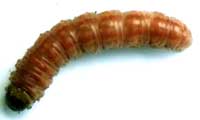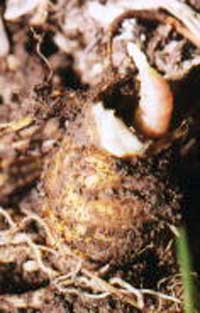 |
The Iris borer over-winters on old leaves or debris as eggs. The eggs hatch in the spring when the leaves are about 6 inches tall. The young larvae burrow into the leaves and eventually bores into the rhizomes. The insect pupates in the soil or the rhizomes and the adult moth emerges in late summer to lay eggs.
Symptoms of Iris Borer
One of the most visible symptoms is poor growth. However the insect often introduces bacterial soft rot which will cause a foul smelling rot.
 |
Controlling Borers Without Insecticides
Cutting Out Infected Rhizomes
If the borer has not invaded too many of the rhizomes of your Iris plant, you can cut out the infected ones to get partial or even total control of the problem.
Flexible Wire Trick
It is possible to kill borers by inserting a flexible wire into their tunnels. The wire approach works only in situations where there are only one or two borers in accessible places and the borer holes are fairly straight and shallow. With a hooked wire, it may be possible to catch the worms and pull them out. Otherwise, use the wire tip to mash the worm. Do this in March or April and again in August or September. Take some care using the wire to avoid extra damage to the Iris plants.
Controlling Borers With Insecticides
Issues in Choosing an Insecticide For Borers
Because borers spend most of their time safely hidden in tunnels inside plant stems or rhizomes, they are rarely harmed by chemical insecticides sprayed on plant surfaces.
Control With Predatory Nematodes
In cases where there are many borer tunnels and/or the tunnels are too crooked or inaccessible to insert a wire to kill them, a biological product, predatory nematodes, may do the job. Mix the powdered microscopic roundworms with water according to package directions and spray the slurry bark surfaces of infested limbs of the tree or shrub. The nematodes enter the holes and seek out the borers as hosts for their eggs, killing them.
Researchers have found the caterpillar nematodes, to be fairly effective biological controls for borers. In tests, when these predatory nematodes were sprayed in solution on the Iris plants and one the soil around the base of the plants heavily infested with borers, up to 85% of the borers were killed after 2 weeks. When the nematodes were sprayed directly into borer holes, borer activity was reduced by as much as 90 percent.

